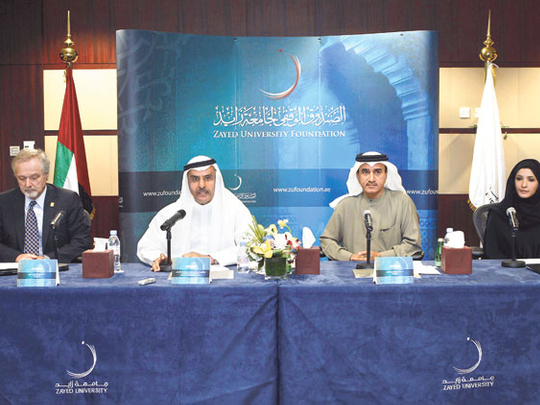
The tradition of endowment funding has its roots in Islam, however most universities in the region have been slow to adopt it.
"We as universities [in the UAE] didn't do it unfortunately. Cambridge, Oxford, Yale have millions and billions of dollars and here in our country we depend on government funding," ZU vice president Dr Sulaiman Al Jasem said at a press conference discussing the educational strategies of the recently launched Zayed University (ZU) Foundation last week.
In recent media reports it was revealed that federal institutions Zayed University and the Higher Colleges of Technology had Dh33 million and Dh110 million of deficit and debt respectively as well as overdraft borrowing, according to an FNC report.
The ZU Foundation was established to encourage partnerships, promote academic programmes and research, engage with the community and generate funds for various initiatives.
The foundation has a permanent committee, which manages the fund under the chairmanship of Ahmad Humaid Al Tayer, Dubai International Financial Centre Governor. ZU President Shaikh Nahyan Bin Mubarak Al Nahyan, Minister of Higher Education and Scientific Research, and Al Jasem are members of the foundation.
The time is ripe
Responding to Gulf News' question on whether he thought federal universities should generate more money for themselves Al Tayer answered: "Yes, worldwide it is happening. I think it is time for that."
"Traditionally endowments started in Islam and 800 years ago Oxford University took exactly the same idea and applied it there. We will have our government funding — that's essential — but in addition to that we are seeking public endowments that will help universities for research and raise some money for activities for students," Al Jasem said.
He said ZU needed to create a culture of endowment and be linked with the community. The ZU Foundation was open to "everybody" with Dh10 million already received as the first contribution.
Al Tayer said, "The federal support will remain, but we want to see the contribution of the community to support education."
He said there are people who want to contribute and the ZU Foundation helps them select from the various areas that they want to contribute — scholarships, information technology, library initiatives or research centres for example. "That will increase the funding for the university and enable them to expand more beyond the government funding." Safia Al Raqbani, ZU Chief Development Officer, said contributors to the foundation will be given naming rights for endowments for their chosen specialisations.
Donors can choose among capital and infrastructure projects, which "reflects the university's determination to provide an inspiring educational environment by updating laboratories, classrooms, and enhancing the libraries to contribute to academic achievement."
Future leaders
Apart from creating a culture of engagement with higher education institutions, contributing to the foundation will serve as a model of giving to prepare the future leaders of the nation, Al Raqbani said.
The Foundation will promote learning with technology, learning resources and teaching methods to empower students with special needs. Scholarships will provide opportunities for students to achieve their undergraduate and graduate studies.
Endowments may be named in recognition of a donor who may designate a donation investment to meet a specific need.
Donors may establish an endowment in their own name or in honour of someone else to serve students in need, Al Raqbani added.











